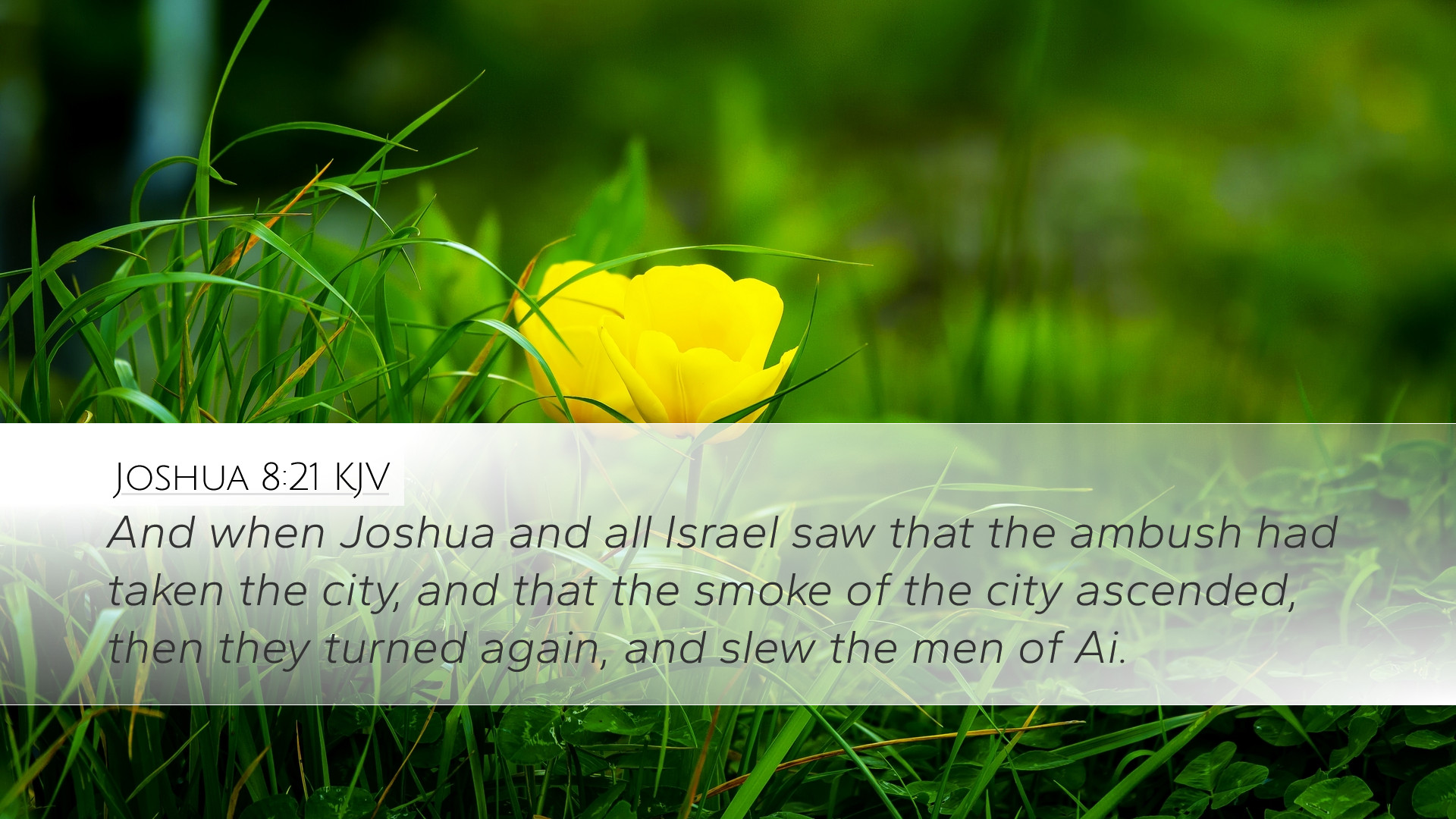Bible Commentary on Joshua 8:21
Joshua 8:21 states, "And when Joshua and all Israel saw that the ambush had taken the city, and that the smoke of the city ascended, then they turned again, and slew the men of Ai." This passage comes at a significant moment in the narrative of Israel’s conquest of Canaan, specifically focusing on the strategic military maneuver led by Joshua. Herein, we will explore various interpretations and insights from notable public domain commentaries.
Understanding the Context
To glean the full meaning of this verse, one must consider the broader narrative surrounding the conquest of Ai. Following the crushing defeat at Ai due to Achan's sin (Joshua 7), the successful strategy executed in Joshua 8 marks a turning point in Israel’s campaign. The ambush is a display of divine strategy and Israel’s obedience to God’s commands.
Insights from Matthew Henry
Matthew Henry highlights the significance of strategy and obedience in warfare. In his commentary, he notes that God had instructed Joshua on how to approach Ai after the previous failure. The ambush signifies God's providence and the fulfillment of His promise to assist Israel in their battles, reflecting His sovereign power. Henry stresses the importance of seeing the smoke as a signal—a representation of God's active role in delivering victories to His people.
Reflections from Albert Barnes
Albert Barnes provides a comprehensive analysis of the military tactics used in this episode. He emphasizes that the ambush set by Joshua was essential for the success of the Israelite army. Barnes notes, "the smoke of the city ascended" serves as a visual cue for the Israelite forces, indicating that their plan was working as intended. Barnes also comments on the emotional response of the Israelite troops, noting the boost in morale upon seeing the signal, which energized their resolve to engage effectively in battle.
Analysis by Adam Clarke
Adam Clarke delves into the theological implications behind the events described. He argues that the turning of the Israelite forces upon seeing the smoke underscores the theme of divine intervention and the critical nature of obedience to God's commands. In Clarke’s analysis, the victory at Ai is not merely a military success but a spiritual triumph as well, reinforcing the necessity for unity and faith in fulfilling God's orders. He writes that this event serves as a reminder that visible signs of God's assistance are often granted to strengthen faith and demonstrate His power.
Significance of Unity and Obedience
Central to understanding Joshua 8:21 is the theme of unity among the Israelites. Both Henry and Barnes highlight that the success of the ambush relied on the coordinated efforts of the Israelite army. This unity reflects a larger principle in the Christian faith: the necessity of collective obedience to God’s will. Pastors and church leaders can draw parallels between this passage and the need for the body of Christ to function cohesively for effective ministry.
Application for Today’s Believers
This historical account offers profound lessons for modern believers. The imagery of smoke as a signaling device symbolizes the presence of God in the trials and triumphs we face. It encourages individuals to remain vigilant and ready to act upon God’s guidance, whether it comes through clear signs or the whispers of the Spirit. Moreover, it advocates for prayerful preparation and strategic obedience in fulfilling the Great Commission.
Conclusion
In concluding our exploration of Joshua 8:21, it becomes evident that the scripture encapsulates vital elements of faith—obedience, unity, and awareness of God’s active presence in our lives. As Joshua led Israel to victory through divine instruction, so too are modern believers called to navigate the complexities of life with faith in God’s plans. For pastors and theologians, the insights garnered from traditional commentaries serve to enrich sermons and teachings, emphasizing the relevance of ancient scripture in contemporary contexts.


